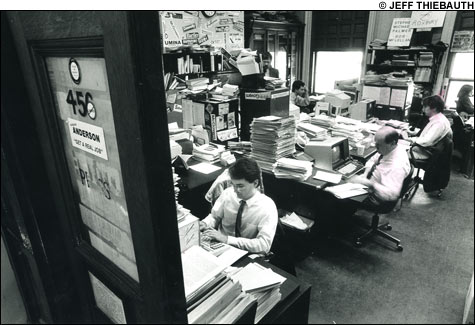If the Globe shrinks, will Beacon Hill run amok?
By ADAM REILLY | June 19, 2009

PAPER TRAIL In happier times, the State House Press Room was abuzz with reporters. Today, it's a moribund shell of its former self. |
The ongoing crisis at the Boston Globe shouldn't be troubling just to devotees of the sports pages and "Coupling." Citizens who prize strong coverage of the Massachusetts State House ought to be fretting over the paper's fate, too. With its four-person State House contingent — bureau chief Frank Phillips, reporters Andrea Estes and Matt Viser, and columnist Scot Lehigh — the Globe has a stronger presence under the Golden Dome than any other major Boston media outlet. Recent developments on Beacon Hill, meanwhile, attest to the Globe's efficacy as a watchdog and agenda setter. For example, the Globe's ongoing coverage of public-pension abuse in Massachusetts paved the way for the pension-reform bill that was signed into law this week. And without the Globe's groundbreaking scoops on Sal DiMasi's dubious financial ties to the Canadian software manufacturer Cognos, DiMasi would probably still be Speaker today, rather than facing a federal indictment.So what will happen to State House coverage in general if the New York Times Co. manages to sell the Globe, and the new owner decides to de-prioritize Beacon Hill? Or if ongoing legal wrangling over the recent 23 percent pay cut for members of the Boston Newspaper Guild, the paper's largest union, makes the Times Co. revisit the possibility of closing the paper altogether?
Chasing scandals
Answers to these questions depend, to a large extent, on whether you see the current State House press corps as a) diminished but still robust, or b) as a fatally compromised shadow of its former self. Take the latter tack, as plenty of political veterans do, and it's hard to be optimistic about how State House journalism might weather a reduced Globe presence on the Hill.
"When I started in the State House in March of 1963, there were 35 bodies in the press room," says Peter Lucas, who covered the building for the Globe, the Phoenix, and the Boston Herald. "Now I walk by, and the room is practically empty. It's very sad. . . . When was the last time you saw a roll call [covered by the media]? When's the last time you saw coverage of a debate in the House or Senate?"
A decade or two ago, adds Pam Wilmot, who began representing the good-government watchdog group Common Cause Massachusetts at the State House in 1989, "There were just so many more reporters who covered the State House, in much greater depth. There was a lot of blow-by-blow coverage that helped the public to feel involved, and to get involved." In contrast, Wilmot argues, today's coverage tends to be scandal-driven — which is sometimes warranted (e.g., DiMasi), but also exacerbates public contempt for and disinterest in state government as a whole.
 Topics
Topics:
Media -- Dont Quote Me
, Michael Dukakis, Rachelle Cohen, Frank Phillips, More  , Michael Dukakis, Rachelle Cohen, Frank Phillips, Salvatore DiMasi, Media, Sean Murphy, Newspapers, Michael Widmer, Peter Lucas, Andrea Estes, Less
, Michael Dukakis, Rachelle Cohen, Frank Phillips, Salvatore DiMasi, Media, Sean Murphy, Newspapers, Michael Widmer, Peter Lucas, Andrea Estes, Less 